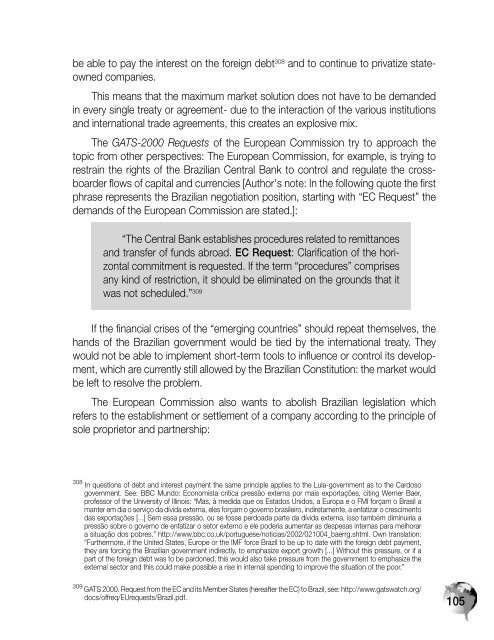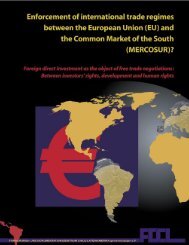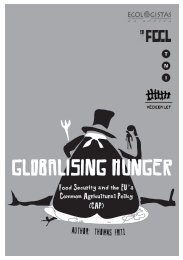Download - FDCL
Download - FDCL
Download - FDCL
Create successful ePaper yourself
Turn your PDF publications into a flip-book with our unique Google optimized e-Paper software.
e able to pay the interest on the foreign debt 308 and to continue to privatize stateowned<br />
companies.<br />
This means that the maximum market solution does not have to be demanded<br />
in every single treaty or agreement- due to the interaction of the various institutions<br />
and international trade agreements, this creates an explosive mix.<br />
The GATS-2000 Requests of the European Commission try to approach the<br />
topic from other perspectives: The European Commission, for example, is trying to<br />
restrain the rights of the Brazilian Central Bank to control and regulate the crossboarder<br />
flows of capital and currencies [Author's note: In the following quote the first<br />
phrase represents the Brazilian negotiation position, starting with “EC Request” the<br />
demands of the European Commission are stated.]:<br />
“The Central Bank establishes procedures related to remittances<br />
and transfer of funds abroad. EC Request: Clarification of the horizontal<br />
commitment is requested. If the term “procedures” comprises<br />
any kind of restriction, it should be eliminated on the grounds that it<br />
was not scheduled.” 309<br />
If the financial crises of the “emerging countries” should repeat themselves, the<br />
hands of the Brazilian government would be tied by the international treaty. They<br />
would not be able to implement short-term tools to influence or control its development,<br />
which are currently still allowed by the Brazilian Constitution: the market would<br />
be left to resolve the problem.<br />
The European Commission also wants to abolish Brazilian legislation which<br />
refers to the establishment or settlement of a company according to the principle of<br />
sole proprietor and partnership:<br />
308 In questions of debt and interest payment the same principle applies to the Lula-government as to the Cardoso<br />
government. See: BBC Mundo: Economista critica pressão externa por mais exportações, citing Werner Baer,<br />
professor of the University of Illinois: “Mas, à medida que os Estados Unidos, a Europa e o FMI forçam o Brasil a<br />
manter em dia o serviço da dívida externa, eles forçam o governo brasileiro, indiretamente, a enfatizar o crescimento<br />
das exportações [...] Sem essa pressão, ou se fosse perdoada parte da dívida externa, isso também diminuiria a<br />
pressão sobre o governo de enfatizar o setor externo e ele poderia aumentar as despesas internas para melhorar<br />
a situação dos pobres.” http://www.bbc.co.uk/portuguese/noticias/2002/021004_baerrg.shtml. Own translation:<br />
“Furthermore, if the United States, Europe or the IMF force Brazil to be up to date with the foreign debt payment,<br />
they are forcing the Brazilian government indirectly, to emphasize export growth [...] Without this pressure, or if a<br />
part of the foreign debt was to be pardoned, this would also take pressure from the government to emphasize the<br />
external sector and this could make possible a rise in internal spending to improve the situation of the poor.”<br />
309 GATS 2000. Request from the EC and its Member States (hereafter the EC) to Brazil, see: http://www.gatswatch.org/<br />
docs/offreq/EUrequests/Brazil.pdf.<br />
105









